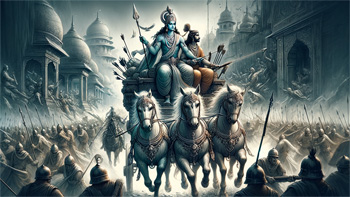The Mahabharata, one of the two major Sanskrit epics of ancient India, is more than just a story; it is a comprehensive narration of the human spirit, covering every aspect of life and ethos. This epic, traditionally attributed to the sage Vyasa, extends beyond a mere historical narrative, offering a deep dive into the philosophy, morality, and spirituality of Hinduism. Its intricate plot and extensive character list encapsulate the complexities of human nature and the dilemmas faced in the journey of life.
Originating from the Indian subcontinent, the Mahabharata dates back to approximately the 8th and 9th centuries BCE, with its final form being reached around the 4th century CE. Spanning over 100,000 shlokas (verses) and about 1.8 million words, it is one of the longest epic poems known and has been profoundly influential not only in India but across the world, shaping the Hindu ethos and worldview.
The Narrative of the Mahabharata
The central story of the Mahabharata revolves around two branches of a royal family, the Pandavas and the Kauravas, and their struggle for the throne of Hastinapur. This rivalry culminates in the Kurukshetra war, a devastating battle that lasts eighteen days and results in immense loss and destruction.
The epic is much more than its central plot, encompassing numerous sub-plots and standalone stories that explore themes of duty, righteousness, loyalty, and the complexities of moral judgments. The characters in the Mahabharata are multi-dimensional, each embodying various virtues and flaws, making them relatable and their experiences reflective of real-life dilemmas.
The Bhagavad Gita: The Spiritual Core of the Mahabharata
Within the Mahabharata is the Bhagavad Gita, a 700-verse Hindu scripture that is one of the most important texts in Hindu philosophy and spirituality. The Gita, as it is commonly known, is set in a narrative framework of a dialogue between Prince Arjuna and his guide and charioteer, Lord Krishna. This conversation, taking place on the battlefield just before the start of the war, addresses the moral and philosophical dilemmas faced by Arjuna and expounds on a range of spiritual topics.
The Bhagavad Gita's teachings on duty, righteousness, and devotion have a profound impact on Hindu thought and have been a subject of extensive study and interpretation over the centuries.
Characters and Symbolism in the Mahabharata
The characters of the Mahabharata are symbolic of various human traits and moral conflicts. From the righteous Yudhishthira, who struggles with his duty and morality, to the strong and loyal Bhima, and the skilled warrior Arjuna, each character's journey offers deep insights into human nature.
The character of Krishna, who plays a pivotal role in guiding the Pandavas, is particularly significant. As an avatar of the god Vishnu, Krishna's teachings and actions throughout the epic provide key philosophical and spiritual lessons.
The Cultural and Religious Significance of the Mahabharata
The Mahabharata is not just a literary masterpiece but a cultural and religious cornerstone. Its stories and teachings are deeply ingrained in the Indian psyche, influencing art, music, dance, and theater. The epic has been adapted into numerous forms, from traditional Sanskrit theater to modern films and television series, reflecting its continued relevance and appeal.
In terms of religious significance, the Mahabharata serves as a guide to dharma (righteousness or duty) and the complexities of living a moral life. It provides a framework for understanding the concepts of karma (action and consequence) and samsara (the cycle of rebirth), which are central to Hindu philosophy.
The Mahabharata in a Global Context
In the global context, the Mahabharata has transcended geographical and cultural boundaries. Its profound philosophical and ethical discussions have garnered interest and admiration worldwide. Scholars, philosophers, and spiritual seekers from various backgrounds have studied and drawn inspiration from this epic, finding universal themes and lessons applicable to all of humanity.
The Mahabharata, with its intricate narrative and profound philosophical depth, continues to captivate and enlighten. As a monumental work of literature and a treasure of ancient wisdom, it offers endless lessons on life, duty, and the human condition, making it a must-read for anyone interested in exploring the rich tapestry of Hindu mythology and the enduring complexities of the human experience.
